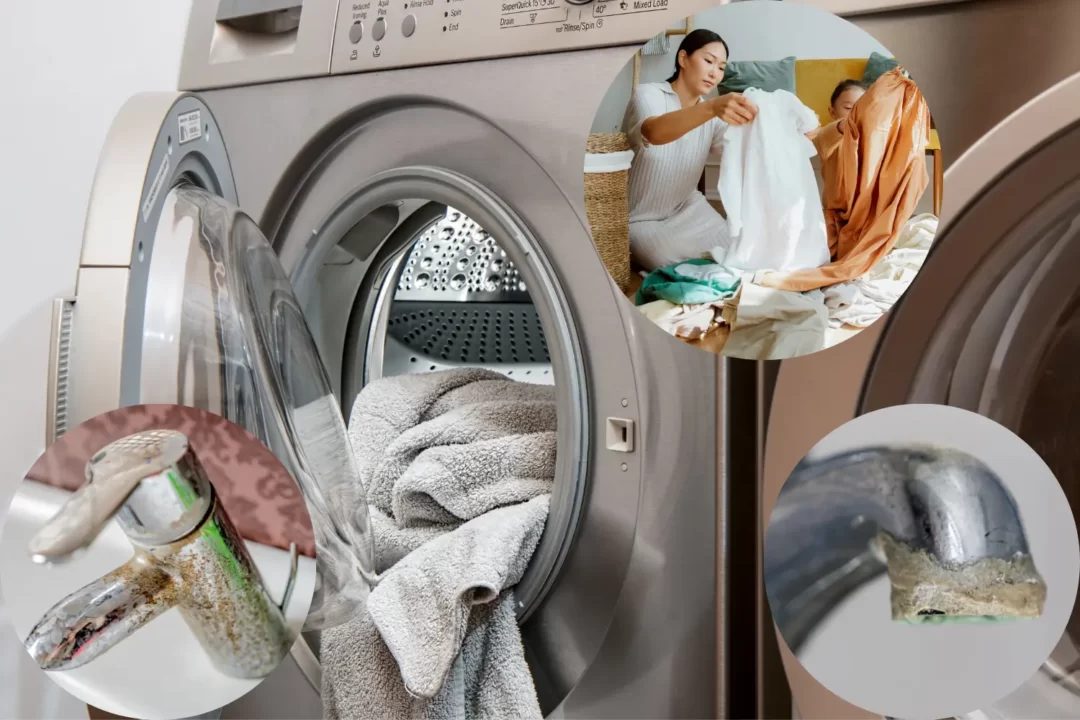Hard Water can make soaps and detergents less effective, leading to the need for more soap or detergent to achieve the same level of cleaning. This water can cause staining or discoloration of clothes, dishes, and other surfaces.
What is Hard Water
Hard water is water that contains a high concentration of dissolved minerals, such as calcium and magnesium.
These minerals are picked up as water passes through rock and soil formations that contain them. The degree of hardness can vary depending on the region and the source of the water.
Hard water can have several negative effects. It can cause mineral buildup in plumbing and appliances, which can lead to reduced water flow and efficiency, as well as increased maintenance costs.
Water softening is a common solution to mitigate the negative effects of hard water. This involves removing the minerals that cause the water to be hard through a process such as an ion exchange or reverse osmosis.

How Hard Water Affect Laundry
Hard water can have a negative impact on laundry in several ways:
- Stiffness and Dinginess: Hard water contains minerals such as calcium and magnesium that can leave behind a residue on fabrics, making them stiff and dingy over time. This can make clothes look dull and feel scratchy, and can even reduce their lifespan.
- Detergent Inefficiency: Hard water can reduce the effectiveness of laundry detergents, as the minerals in the water can react with the detergent, making it less effective at removing dirt and stains. This can lead to clothes not getting as clean as they should and even require using more detergent.
- Discoloration: Hard water can cause clothes to become discolored over time, as the minerals can react with the dyes in the fabric. This can result in clothes losing their vibrant colors and looking faded.
- Wear and Tear: The minerals in hard water can also cause fabrics to break down more quickly, which can lead to holes and tears in clothes.
Know about, Doing laundry in freezing weather
How to Soften Hard Laundry Water
There are a few ways to soften hard laundry water:
1. Use a water softener
Installing a water softener in your home is the most effective way to soften hard water. Water softeners remove the minerals that cause hardness from the water supply, which can improve the quality of your laundry water and make clothes feel softer and look brighter.
2. Use a laundry detergent designed for hard water
Many laundry detergents are formulated specifically for use in hard water and can help to improve the cleaning performance of your laundry detergent. These detergents often contain water-softening agents, which help to neutralize the minerals in hard water and improve the overall quality of the wash.
3. Add baking soda or borax
Adding baking soda or borax to your laundry can help to soften hard water and improve the cleaning performance of your detergent. Simply add 1/2 cup of baking soda or borax to the wash cycle along with your detergent.
4. Use white vinegar
Adding white vinegar to the rinse cycle can help to soften hard water and remove any mineral buildup on clothes. Add 1/2 to 1 cup of white vinegar to the rinse cycle for best results.
5. Wash in warm or hot water
Hard water minerals dissolve more readily in warm or hot water than in cold water. This means that washing your clothes in warm or hot water can help to soften hard water and improve the quality of your laundry water.
Read for, Buying laundry detergent with an OTC card
How To Soften Hard Water For Washing Hair
There are several ways to soften hard water for washing hair, including:
- Diluting the hard water: One way to soften hard water for washing hair is to dilute it with soft water.
You can mix the hard water with an equal amount of distilled water, or use a shower filter that can remove some of the mineral content from the water. - Using a vinegar rinse: Another way to soften hard water for washing hair is to use a vinegar rinse.
After shampooing, mix 1/4 cup of apple cider vinegar with 2 cups of water and pour it over your hair. Leave it on for a few minutes, then rinse it out with warm water. - Using a chelating shampoo: Chelating shampoos are designed to remove mineral buildup from hair caused by hard water.
Look for shampoos that contain ingredients such as EDTA, which can help remove the minerals from your hair. - Using a clarifying shampoo: Clarifying shampoos are also effective at removing mineral buildup from hair.
These shampoos are designed to remove product buildup and other impurities from the hair, which can include minerals from hard water.
It’s important to note that while these methods can help soften hard water for washing hair, they may not completely eliminate the negative effects of hard water.
Additionally, it’s important to use caution when using vinegar or chelating shampoos, as they can be harsh on some hair types.
Final Words
However, it is important to check the care label of your clothes before washing them in hot water, as some fabrics may not be able to withstand high temperatures.
Washing clothes with hard water can lead to clothes that look and feel worn out and may need to be replaced more frequently.
To prevent the negative effects of hard water on laundry, it’s recommended to use a water softener, which removes minerals from the water, or a detergent designed for hard water.
Additionally, adding vinegar or baking soda to the wash can help to neutralize the minerals in hard water and improve the overall cleanliness and appearance of laundry.